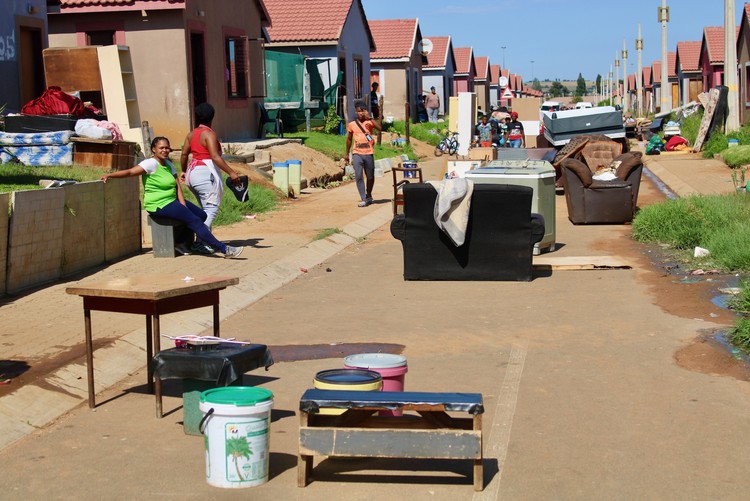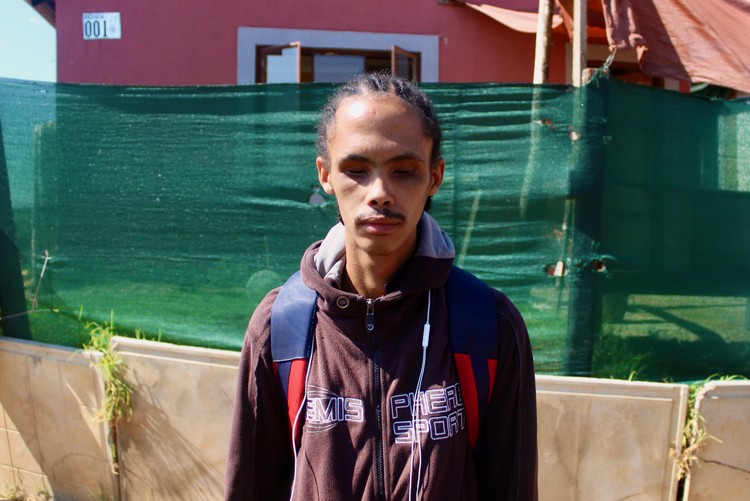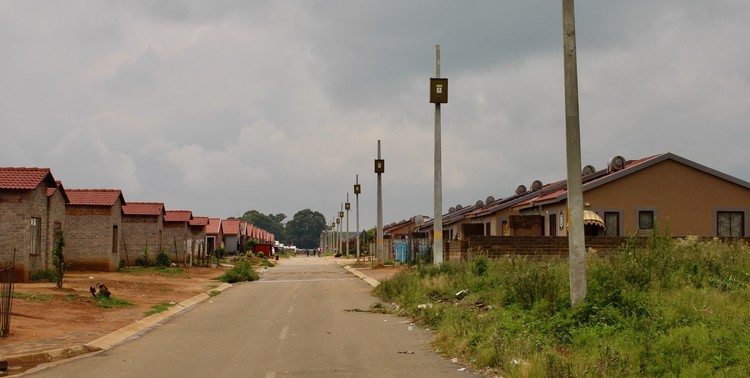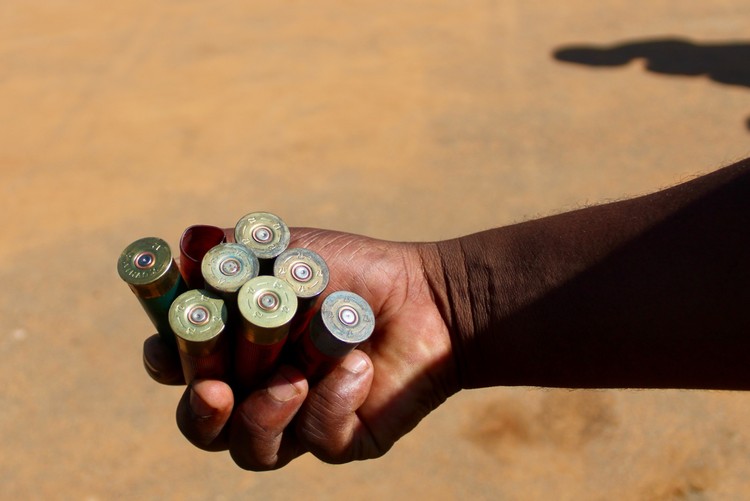Rubber bullets fired as over 2,000 people evicted from Nigel housing occupation
Lawyers for the occupiers have subsequently secured a stay of the eviction order in the Gauteng High Court
On Tuesday morning about 500 families were evicted after unlawfully occupying RDP houses in Nigel since 2019. Photos: Kimberly Mutandiro
- About 500 families unlawfully occupying RDP houses in Mackenzieville Extension 2, Nigel, were evicted early on Tuesday morning.
- No notice was given that the eviction would take place on Tuesday according to the community and the local councillor.
- There was resistance and police used rubber bullets.
- No alternative accommodation, not even emergency shelter, has been offered to the evictees.
- Lawyers for the occupiers immediately and successfully went to court with an urgent application to stay the eviction order. The matter will be heard on 3 March.
About 500 families unlawfully occupying RDP houses in Mackenzieville Extension 2, Nigel, were evicted early on Tuesday morning.
People stood in disbelief as their possessions were thrown out of houses most have occupied since 2019. The eviction came as a shock. No alternative accommodation, not even emergency housing, has been offered to the evicted families. Some said they will sleep outside.
When GroundUp got to the scene we met people nursing wounds from rubber bullets. Martin Kramer, 13, who had two bullet wounds on his left leg, said he was shot on his way to his mother’s house. Thobeka Mhlangu was bleeding from a wound to her breast.
No official notification was given that the eviction was to take place on Tuesday. The local councillor says not even he was informed.
But apparently a tip-off, emanating from the local police station, set WhatsApp messages circulating on Monday evening.
Residents then blocked all roads leading to the RDP houses with logs and burning tyres. Police arrived after midnight to monitor the situation. By the early hours, they were firing rubber bullets. The eviction squads arrived around 5am. They proceeded to break down doors and remove the occupiers.
“Other people ran for their lives as rubber bullets were being shot, but l could not,” 23-year old John Richard Webb, who is blind, told GroundUp. “During all the confusion, l was lucky to find a place to hide. They should just let us have the house, because we have no place to go.”
John Richard Webb, who is blind, said he was “lucky to find a place to hide” during the chaos when rubber bullets were fired by police at resisting occupiers.
Thokozo Mbengene stood with her three children outside her home of four years. Her children attend the local Mackenzieville Primary School. “My children are confused. They have been asking me where we are going to go. To be honest, I do not know what to tell them.”
Tina Minnaar, 63, said she is a qualifying housing beneficiary and had waited 30 years for a house before occupying the one from which she had just been evicted.
“How can they kick a poor widow out?” she asked.
Councillor Wollaston Labuschagne (DA) said, “I can confirm that neither the [provincial] human settlements nor the Ekhuruleni metro police department informed or confirmed to me that the evictions would take place this morning.”
Protracted legal battle
The original eviction order made by Judge Molahlehi was that the properties were to be vacated by 21 July 2021, failing which the Sheriff was authorised to evict the occupiers from 14 July 2021.
That order was never executed because the occupiers lodged an appeal, which was heard on 7 December 2021 and subsequently dismissed.
On Tuesday, Desmond Brown, an attorney from Chris Billings who has been representing the occupiers, filed an urgent notice of intention to oppose the eviction in the Johannesburg High Court, on the basis that evictees be provided with temporary emergency accommodation.
In an urgent application brought on Tuesday, lawyers for the occupiers argue that the dates for vacation and eviction have prescribed, and it was therefore incumbent on the City to approach the court for a new order setting new dates.
In an affidavit, Jerome Badenhorst, one of the occupiers, said, “We were not given prior notice of the date of the intended eviction nor were we engaged in any way.”
He said, “The majority of the occupiers facing eviction are female-headed households with minor children. At last count there were approximately 700 children of school-going age.”
Furthermore, the community has been raising funds to take their case to the Supreme Court of Appeal, and had last week finalised powers of attorney and compiled affidavits setting out the personal circumstances. They were to file these papers in court by 7 March.
They also say they now have Prevention of Illegal Eviction from and Unlawful Occupation of Land Act (PIE) rights.
On Tuesday the Gauteng High Court ordered that the 2021 eviction order be stayed pending a legal determination. The matter is set down for 3 March.
The occupied RDP houses prior to the eviction on Tuesday
How the occupation came about
In July 2022, we reported on the history of the resistance to the eviction and the protracted legal battle surrounding the occupation.
In 2019, about 500 families, led by the Greater Nigel United People’s Parliament, unlawfully occupied the Mackenzieville RDP project, which had started in 2014 but had stalled.
Many of the houses were incomplete and all stood abandoned and left to be vandalised. The occupiers claim to have saved the houses from ruin. Some fixed up the houses with their own funds.
Vridgett Webb, who occupied one of the houses with her husband and three children, connected water to the house and put in solar panels and a battery for power.
“When we moved into the RDP house it was partially vandalised. We fixed everything. Living in this house has been a dream come true because we have done everything to make it feel like home. Evicting us is out of the question,” Webb told GroundUp earlier this month.
The occupation has underlying racial tensions as the occupiers are mostly coloured former backyarders from Alra Park, while the legal beneficiaries are mostly black shack dwellers from Snake Park.
The occupiers claim that the Nigel housing office prioritised black people living in informal settlements over them.
“Coloured people in our community deserve to be given the RDP houses because they have been marginalised. We were sidelined from the initial housing registration phase in 1994, particularly here in Alra Park,” said Gerard van Greenen from the Gauteng Housing Crisis Committee in the weeks prior to the eviction on Tuesday.
“Outsiders were given houses and most RDP houses in our area were allocated to black people,” he said.
“There has been a lot of corruption in the housing project. For instance, only 600 houses were built instead of 1,200, which means it’s a failed project.”
“People used their own money to fix the houses for themselves. It’s been four years and people are used to the environment and they have children in [local] schools … We will go to the Constitutional Court if the need arises,” said Greenen.
Meanwhile, Gary Mkwanzi, from Snake Park informal settlement, who was meant to be a beneficiary in the Mackenzieville housing project, said his dream of getting a house was shattered by the unlawful occupation.
“When the people moved into those houses they said they were safeguarding them against vandalism and would make way for the rightful owners when the time comes, but it seems it’s becoming a problem now,” says Mkwanzi.
He said people in Snake Park, including many elderly people, were the rightful beneficiaries for Mackenzieville extension 2.
He said they had heard that some of the occupants had sold the houses to people from Vosloorus, Kwathema and Thembisa.
He said the people of Snake Park were prepared to take matters into their own hands, but at a community meeting the housing department promised to evict the occupiers.
Politics
Prior to the eviction, Councillor Labuschagne told GroundUp: “It seems that the eviction is driven and pursued politically by ANC structures. I can only speculate that it is to please ANC voters that insist on getting houses at the Mackenzieville Ext 2 development. This project was managed by the ANC since 2014 and never completed.”
On Tuesday he said, “I will pursue the matter, I will get the proof and share all the information with the community.”
He said the RDP project had been funded by the provincial housing department who implemented it jointly with the City’s human settlements department. But since it was not yet an established, completed residential area, the City was not yet responsible for basic services or maintenance and repairs.
He said bulk electrical infrastructure was installed, but individual houses were not connected. Sewage has been a problem because the development was not completed. Labuschagne said when a contractor was appointed in 2022 to carry out repairs to the sewers, people from Snake Park informal settlement stopped them working.
“The government has failed our community,” said Mahammed Fareed, a community representative, on Tuesday. “Much as they may want to say this is not racial it is very racial.”
Rubber bullet cartridges collected after the eviction on Tuesday
Tahir Sema, spokesperson for the Gauteng Department of Human Settlements, said the City of Ekurhuleni human settlements department was responsible for the reticulation and internal installation of the sewer system.
“The sewer problem can only be rectified once the eviction process is complete. “
“The community stopped the contractor appointed to conduct remedial works on the water and sewer pipes.”
“For the electricity to be legally connected to the houses, the rightful beneficiary needs to be occupying the house, a user agreement signed by the rightful beneficiary, a municipal account opened for the rightful beneficiary and only then can electricity be connected by the City of Ekurhuleni Energy Department.”
GroundUp tried at length to get comment about the occupation prior to the eviction from the City but without success.
Support independent journalism
Donate using Payfast

Don't miss out on the latest news
We respect your privacy, and promise we won't spam you.
Next: Parliament urged to investigate R54-million national orchestra
Previous: Women march through Dunoon against gender-based violence
© 2023 GroundUp. This article is licensed under a Creative Commons Attribution-NoDerivatives 4.0 International License.
You may republish this article, so long as you credit the authors and GroundUp, and do not change the text. Please include a link back to the original article.
We put an invisible pixel in the article so that we can count traffic to republishers. All analytics tools are solely on our servers. We do not give our logs to any third party. Logs are deleted after two weeks. We do not use any IP address identifying information except to count regional traffic. We are solely interested in counting hits, not tracking users. If you republish, please do not delete the invisible pixel.




